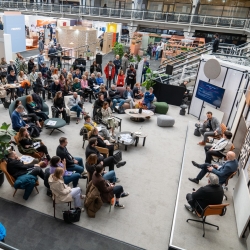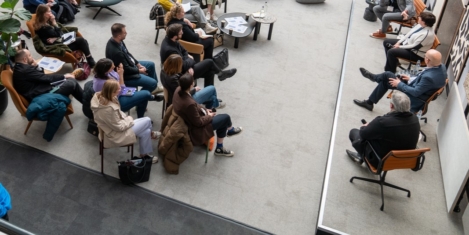To provide the best experiences, we use technologies like cookies to store and/or access device information. Consenting to these technologies will allow us to process data such as browsing behaviour or unique IDs on this site. Not consenting or withdrawing consent, may adversely affect certain features and functions.
The technical storage or access is strictly necessary for the legitimate purpose of enabling the use of a specific service explicitly requested by the subscriber or user, or for the sole purpose of carrying out the transmission of a communication over an electronic communications network.
The technical storage or access is necessary for the legitimate purpose of storing preferences that are not requested by the subscriber or user.
The technical storage or access that is used exclusively for statistical purposes.
The technical storage or access that is used exclusively for anonymous statistical purposes. Without a subpoena, voluntary compliance on the part of your Internet Service Provider, or additional records from a third party, information stored or retrieved for this purpose alone cannot usually be used to identify you.
The technical storage or access is required to create user profiles to send advertising, or to track the user on a website or across several websites for similar marketing purposes.
 The Workspace Design Show returned to the Business Design Centre from 27- 28 February 2023, with exhibitors and visitors alike hailing it as a must-attend addition to the trade show calendar and a place where the workplace community can come together to be inspired and network. The overarching theme for this year’s show was Destination Workplace: Places Where People Want To Be, exploring how to create environments where employees have a desirable experience at their workplaces. (more…)
The Workspace Design Show returned to the Business Design Centre from 27- 28 February 2023, with exhibitors and visitors alike hailing it as a must-attend addition to the trade show calendar and a place where the workplace community can come together to be inspired and network. The overarching theme for this year’s show was Destination Workplace: Places Where People Want To Be, exploring how to create environments where employees have a desirable experience at their workplaces. (more…)














 A new study claims that hybrid working is leading to a healthier workforce, with more time being dedicated to exercise, sleep and healthy eating. Research among more than 2,000 hybrid workers by IWG suggests that the time saved by reduced commuting has led to multiple health and wellbeing benefits including weight loss, better cooking habits, improved mental health and a longer night’s sleep.
A new study claims that hybrid working is leading to a healthier workforce, with more time being dedicated to exercise, sleep and healthy eating. Research among more than 2,000 hybrid workers by IWG suggests that the time saved by reduced commuting has led to multiple health and wellbeing benefits including weight loss, better cooking habits, improved mental health and a longer night’s sleep. 






 In the latest episode of the Workplace Geeks podcast, one of the world’s leading experts on work and workplace, Kate Lister, focuses on a recent study in collaboration with Owl Labs, ‘State of Remote Work 2022’. The report, in its 6th year, provides a platform for a much broader conversation about hybrid and remote working (spoiler alert: terms which Kate hates by the way), Kate’s invitation to speak during the pandemic to United States Congress about home-working, and GWA’s long standing and freely available ROI and savings calculators. James returns following his blacksmithing course in the Peak District to a new discussion format – no more Pinder Ponder, get ready for the reflection section.
In the latest episode of the Workplace Geeks podcast, one of the world’s leading experts on work and workplace, Kate Lister, focuses on a recent study in collaboration with Owl Labs, ‘State of Remote Work 2022’. The report, in its 6th year, provides a platform for a much broader conversation about hybrid and remote working (spoiler alert: terms which Kate hates by the way), Kate’s invitation to speak during the pandemic to United States Congress about home-working, and GWA’s long standing and freely available ROI and savings calculators. James returns following his blacksmithing course in the Peak District to a new discussion format – no more Pinder Ponder, get ready for the reflection section.












March 9, 2023
Progress depends on heterodox thought and difficult questions
by Mark Eltringham • Comment, Facilities management, Wellbeing, Workplace design
(more…)